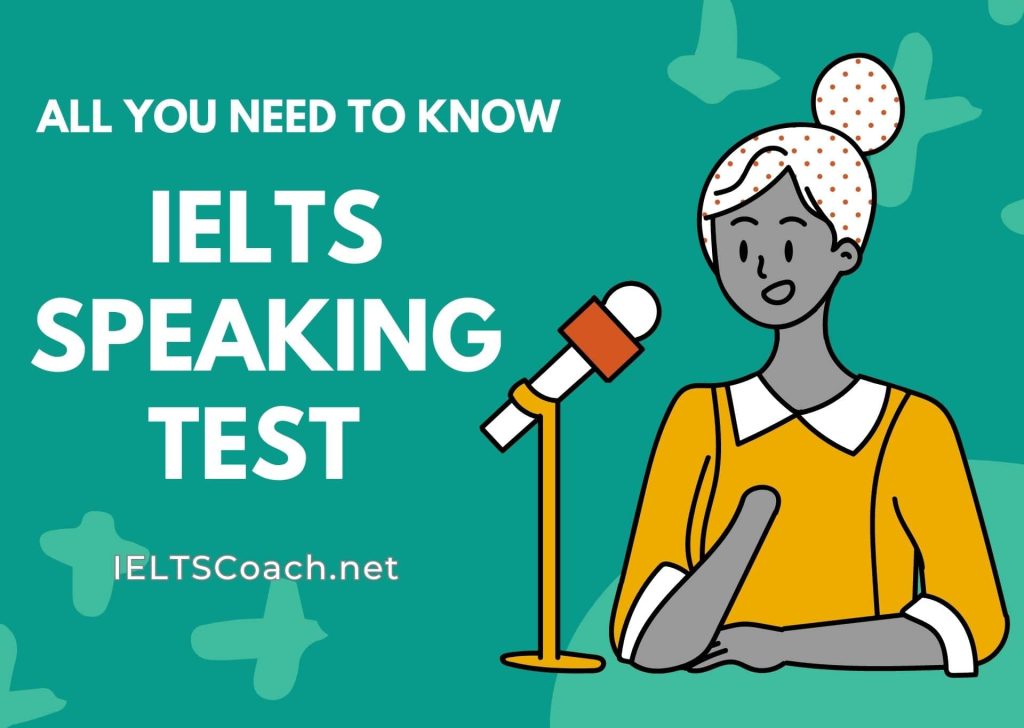IELTS Speaking Test – All you need to Know
Table of Contents
Introduction
IELTS speaking test is a test to evaluate your proficiency in speaking English. Unlike other modules of IELTS test, this is not a group test. In the room for speaking test, there will be only 2 individuals – 1 will be the examiner and the other one will be you (as in the candidate). The format of this test is more like an interview wherein the examiner will ask you questions and you will answer them.
This test is divided in 3 parts. Part 1 and Part 3 are question-and-answer types. In these parts, the examiner will ask questions to the candidate and the candidate has to answer them. In part 2, the candidate will be given a topic on which the candidate has to speak for 2 minutes. A time of 1 minute will be given to the candidate to prepare for the 2 minutes of speaking time.
What to expect at the test?
Before part 1 of the actual test
The examiner will ask you basic questions like your name, and how can he or she address you for the rest of the test. The examiner will also ask you for your ID. After that, the test will begin. Most of the time, the examiner will notify the candidate about it.
This may take about 2 to 5 minutes. Also, after this part, the examiner will start recording the session.
Part 1 of the IELTS Speaking Test
The examiner will ask about 3 to 5 questions. These are a bit basic and more introductory in nature. The topic of these questions could be related to work, family, studies, home, place, interests, and hobbies.
This part usually takes up to 5 minutes.
Part 2 of the IELTS Speaking Test or Cue card
In this part, the examiner will give a topic (Cue card) to the candidate. The candidate will be given a time of 1 minute to prepare for the topic. After the given minute has ended, the candidate has to speak on the topic for 2 minutes.
This part usually takes about 3 to 5 minutes.
Part 3 of the IELTS Speaking Test or Follow-up questions
The examiner will ask you questions on the topic of your cue cards. These are usually 5 to 7 questions and are mostly related to your response on the cue card topic. If your speaking and fluency are really good, the examiner might ask you more questions and deviate a little bit from the topic. This may happen with candidates who score 8 or more bands in speaking.
This part usually takes about 5 to 7 minutes.
The total duration of the test would be somewhere in the range of 15 to 20 minutes.
IELTS speaking tips
- The primary thing that your examiner is looking for is fluency. Fluency is when you are able to communicate in English without making those ‘umm’ sounds or going into a quiet mode where you stop speaking at all.
- The first thing that you need to do is practice as many topics as you can. Find the topics from any available source. Once you have the topic, prepare a 2-minute answer for that particular cue card. Now, start the audio recording on your phone and start speaking on the topic. See if you are able to speak for a full 2 minutes or not. If not, then add more content to your answer.
- After that, listen to your recorded audio and look for repetitive words. Write those words down. Search on Google for the synonyms of the words that you just wrote down. Also, read the examples and understand how you can use these words. This will help you in improving your vocabulary.
- Type your answer in Grammarly and it will give you suggestions or point out your grammatical mistakes. Make a note of this and rewrite and rerecord your answer.
- Do this for all 3 parts of the test.
- Remember one thing: There’s no shortcut here. You will have to work hard and really commit yourself to improving your IELTS speaking score.
Frequently Asked Questions on IELTS speaking test
How ielts speaking score is calculated
Here’s a link to the official page: Link
The simplified explanation of this answer would be that you will be evaluated for: 1) Fluency and coherence (whether your speaking was on the topic or went off-topic), 2) Vocabulary, 3) Grammar, and 4) Pronunciation.
IELTS speaking for beginners
IELTS is a test. Just like any other test, you will have to work hard and commit yourself to the preparation. I have already mentioned the tips above. If you have any questions, feel free to leave a comment below.
How to answer ielts speaking part 1
The questions in part 1 are more introductory in nature. Your answers to these questions should not be too short or too long. As a rule of thumb, I would say use 2 sentences in your answers for the part 1 questions.
For example, the question is: what is your name?
The answer: My name is Dhruv Mangukia. My friends and family members call
me by my first name, which is Dhruv.
Anything more than this would be too much and less than this would be too less. What I mean is you lose points in these situations.
IELTS speaking for academic
There’s no such thing as IELTS speaking for academic or general test. The evaluating parameters are the same for both formats. Also, the format of the test itself is also the same.
IELTS speaking for general training
As mentioned above, there’s no difference in IELTS academic and IELTS speaking for general training.
Other article: Describe a time when you got up early
